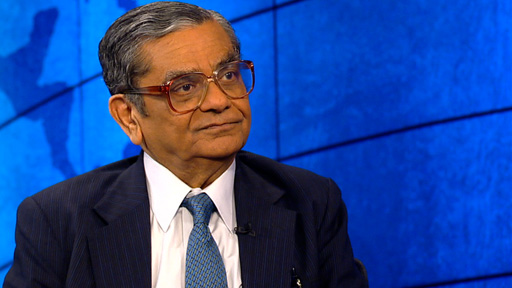Jagdish Bhagwati University Professor of Economics - Biography
Childhood and Education
 Jagdish Natwarlal Bhagawati was born on July 26th in the year 1934 in Bombay. His parents and all elders were hailing from Gujarat. He received a Bachelor of Arts degree from the prestigious Sydenham College, Mumbai. After that, he travelled to England to continue his studies at St John’s College, Cambridge and he received a second degree as Bachelor of Arts at Cambridge in the field of economics in the year 1956. From the Massachusetts Institute of Technology, he received a PhD in economics in the year 1961 for his thesis titled essays in international economics. It was supervised by Charles P. Kindleberger who was an economic historian and author of almost over thirty books. Jagdish Bhagawati got married to a Russia specialist and a Columbia economist Padma Desai. They have one daughter. He is a brother of S.N.Bhagawati who is a famous Neuro surgeon and also to P.N.Bhagawati who is the chief justice of India. Bhagawati and Padma desai’s joint venture 1970 OECD Study India: planning for industrialization was a remarkable and a fantastic notable one gem of a contribution at that point of time.
Jagdish Natwarlal Bhagawati was born on July 26th in the year 1934 in Bombay. His parents and all elders were hailing from Gujarat. He received a Bachelor of Arts degree from the prestigious Sydenham College, Mumbai. After that, he travelled to England to continue his studies at St John’s College, Cambridge and he received a second degree as Bachelor of Arts at Cambridge in the field of economics in the year 1956. From the Massachusetts Institute of Technology, he received a PhD in economics in the year 1961 for his thesis titled essays in international economics. It was supervised by Charles P. Kindleberger who was an economic historian and author of almost over thirty books. Jagdish Bhagawati got married to a Russia specialist and a Columbia economist Padma Desai. They have one daughter. He is a brother of S.N.Bhagawati who is a famous Neuro surgeon and also to P.N.Bhagawati who is the chief justice of India. Bhagawati and Padma desai’s joint venture 1970 OECD Study India: planning for industrialization was a remarkable and a fantastic notable one gem of a contribution at that point of time.
Career
He is actually a very famous University Professor in the field of Economics and Law at the University of Columbia and the most senior member in the international economics at the council of Foreign Relations. Although the world has given him a unique recognition in the field of economics and called him one of the finest economists of all time in his generation, his contribution to the field of immigration and migration policies over the past three decades stand as a mark of standard and a fantastic benchmark to measure the brilliance of this human being. He literally extended his intelligence in providing answers to almost all sorts of questions that were raised by the standards that were previously set by the international critically acclaimed migration policy experts. His significant contributions to various fields like these automatically set a great deal of expertise in the world situations.
Mr Bagawati showed his interest in proposing theories to the analysis of the growing phenomenon of a merely observed international personal mobility and the factors influencing the problems that are caused by the improper tax system being employed in various places of the world. He proposed a special theory to extend the source-country income tax to the then available resource of skilled migrants to further development gained a media and public policy attention and also significant scholarly in the year 1970. Several discussions with various scholars around the world happened and the derived and proposed theories on tax system has been termed as “Bhagawai Tax” which raised a number of questions and challenged many of the existing old theories that were being followed at that point of time. Later on, the so called “Bhagawati Tax” system is being reviewed in the recent years and it has currently been under discussion by the scholars, NGOs and the policy makers of the standards that would be set for all the other fields of the world to be followed.
In the late 1970’s, Bhagawati worked on the proposed policies and acted as a chief editor in correcting and representing the proposed theories accurately so that no further ambiguity or misconceptions would arise. He re edited the two symposia and the questions related to the immigration policies in the journal of public economies as well as in the journal of the developmental economies.
A stream of windows: the trade and the unsettling reflections on it, immigration and democracy in the year 1988 and The wind of the hundred days explaining how Washington did mismanage the globalization in the year 2000 were the two extremely well written books on public policy that were published successively in MIT press in two volumes in the category of public policy.
His very new and the most recent latest article on immigration were published on Jan/Feb 2003 Davos issue of foreign affairs which was titled as the borders that were beyond control. In this particular case study, the professor highlighted the necessity for the shift of immigration policy away from the forceful attempts at curbing the migration and its adverse affects to copying with it. He is currently working as the Director of the program on International Migration.